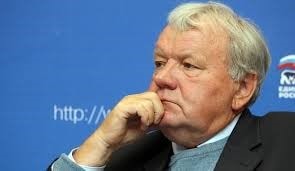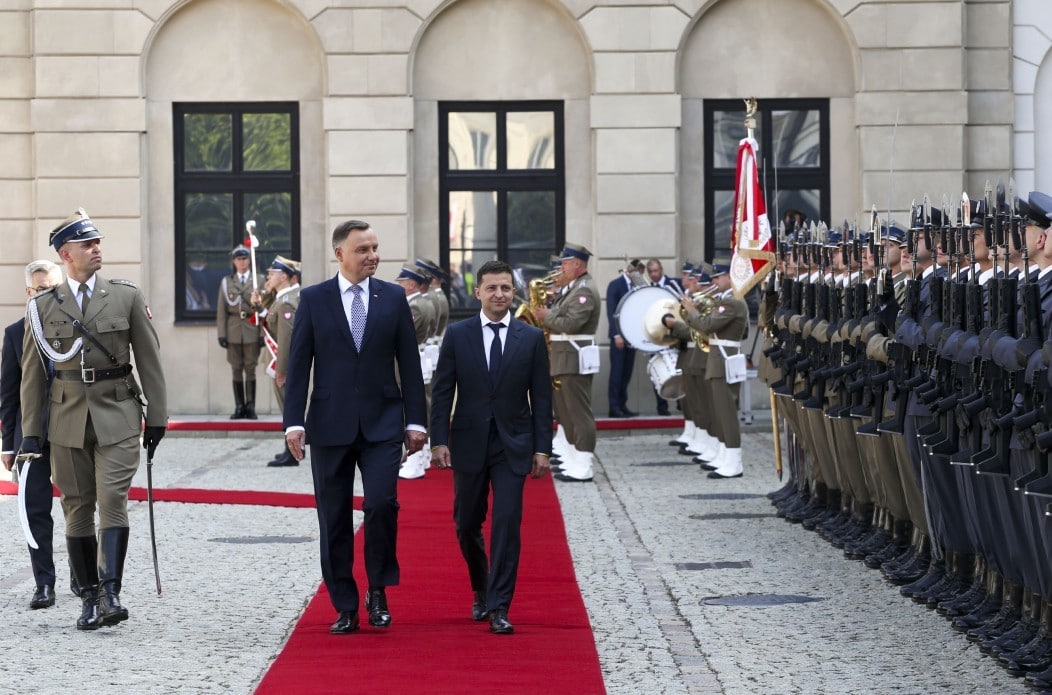Social philosopher and political scientist Dr. Aleksandr Tsipko, a senior researcher, at the Russian Academy of Science's Institute of Economics, is not hesitant about taking controversial positions. While most of Russia was elated by the 2014 annexation of Crimea, he opposed it. While warning about regime neo-Stalinism, he also condemned a leading opposition activist, Alexei Navalny as another Lenin.
Here he wades into another controversial topic – Russia's responsibility for the Second World War. This has recently been in the news in exchanges between Poland and Russia on the subject,[1] and the issue also surfaced when French President Emanuel Macron accused Russia of rewriting history.[2] In an article titled "Soviet myths: why it is time to abandon the idea of unity of Russians and Ukrainians-- The truth about the USSR, which people fear to say aloud," Tsipko explores the reason why the various protagonists have failed to move on from the subject. While he agrees that countries such as France and Poland, who participated in the rape of Czechoslovakia are hypocritical, and that Vlodomyr Zelenski, the Ukrainian President is playing fast and loose with history, the main issue is that Russia under Putin is jettisoning the anti-Communist legacy of Gorbachev's perestroika, and justifying the crimes of Stalin. In this situation, Russia will continue to be hated, and will inspire defensive alliances against her. Tsipko's article follows below:[3]

Tsipko (Source: Mirnov.ru)
The Russian political elite is still in a shock after the Vlodomyr Zelensky’s speech [he gave] during the plenary meeting of the Polish and Ukrainian delegations (Warsaw, January 28, 2020). After the so-called "revolution of dignity" in 2013 the anti-Russian rhetoric [which appeared] in speeches of Ukraine’s President was never that strong as in Zelensky’s speech at this meeting. Vlodomyr Zelensky, on whom the Russian leadership place so many hopes, surpassed [his predecessor] Petro Poroshenko himself in his anti-Russianness [anti-Russian rhetoric]. In his speech at a meeting with the President of Poland, he made it clear that from his perspective, the USSR was one of the parties guilty of unleashing World War II, and that the "criminal conspiracy of the totalitarian regimes" [of] Hitler and Stalin "allowed the Nazis to commit the Holocaust." And, as Zelensky said, the choice for an independent Ukraine lies with Poland " to move into the future with an open heart."
In my opinion, all these 'oohs' and 'groans” about Zelensky’s aggressive anti-Russianness are caused primarily by the fact that the Russian Federation's political elite, that appeared in 1991, still fails to understand the real reasons behind the collapse of the Slavic Russian world and the original anti-Russian nature of independent Ukraine. And, secondly, due to the fact that she [political elite] cannot decide of "which" USSR is the Russian Federation the lawful successor: is it Stalin's Soviet Union or the anti-Stalinist Soviet Union of [Gorbachev's] Perestroika[4]. Our current political elite has forgotten that the USSR value system USSR during Perestroika was radically different from traditional Soviet values. The current political elite's fear of seeing the truth about the USSR, about its foreign policy, and the fear of uttering this truth out loud is responsible for the failure to overcome the Soviet era's legacy.
Likewise, the failure to overcome Soviet myths is responsible for the image of Ukraine, which lives on in the minds of our political elite about Russians and Ukrainians being a divided people and as "brothers forever". Even prior to the 1917 revolution, historians who studied the nature of Ukrainian separatism warned that if Ukraine became autonomous, then it would inevitably turn into an anti-Russian country very quickly.
SUPPORT OUR WORK

And the experience of the UPR [Ukrainian People's Republic], was the first independent Ukrainian state (1918–1920), especially [Pavlo] Skoropadsky’s foreign policy showed that an independent Ukraine will always be friends with Russia's sworn enemies.[5] And it is no accident that at their aforementioned meeting, Zelensky and [Polish President Andrzej] Duda took pleasure in recalling that the [Ukrainian] army of [Symon] Petliura fought against the Bolsheviks alongside the army of [Jozef] Pilsudski during the Polish-Soviet War in 1920. Incidentally, the historian Nikolai Ulyanov, in his book dedicated to the history of Ukrainian separatism's formation, directed attention to the fact that “Ukrainianness” [Ukrainian national identity] main ideologue, Taras Shevchenko, was frankly a Polonophile to the core. So that there was nothing unexpected in that (as a result of a hybrid war in the Donbass) some Poles came to die for an independent Ukraine, and the leadership of Ukraine and Poland declared their inseverable spiritual unity.

Ukrainian President Vlodomyr Zelensky is escorted down the red carpet by his host, Polish President Andrzej Duda (Source: Kyivpost.com)
And wasn’t it obvious that the 'Russian Spring' of 2014 [the annexation of Crimea] would not only lead to the transformation of Ukraine into an open enemy of Russia, but would also push Ukraine into the embrace of Poland, who is the traditional enemy of our country. However, in the early 1990s, your obedient servant pointed out the obvious: 'independent' [the Ukrainian nezalezhnaya in original] Ukraine means first of all a Ukraine that is independent of Russia, and her identity will be founded upon the troubles caused it by Russia, and that means that it [Ukraine] will distinguish its Ukrainianness from that which was 'common' during the Soviet times. Hence this absurdity that Auschwitz was liberated not by the Soviet army, but by ethnic nationalists. Was there an independent Ukraine in 1945 and was there some other army distinct from the army of the USSR?
And, in my opinion, the sooner we abandon Soviet myths about the indestructible spiritual unity of Russians and Ukrainians, the more our foreign policy will be based on the real interests of the former RSFSR [Russian Soviet Federative Socialist Republic], which has become the Russian Federation.
To understand the nature of the current [war] (not only the Russian-Ukrainian cold war), it is important to understand what value system provoked it. After all, the truth is that today we are simultaneously the political successors to two completely different USSRs. On the one hand, there is the political succession to the Stalinist USSR ideology, or to put it more precisely, the pre perestroika USSR; [on the other hand] there is a political succession to Gorbachev's USSR, the USSR of Perestroika. And we do not see and fail to take into account that the ideological legitimacy of these two USSR was completely different. The ideology of the USSR during Perestroika was actually an anti-Communist one, and therefore it was no accident that it was precisely during the time of Perestroika USSR that the Molotov – Ribbentrop Pact and the secret protocols of the Non-Aggression Treaty between the USSR and Germany of August 1939 were condemned. There is nothing novel in Zelensky's statement about Stalinism as a totalitarian regime. Long before Vladimir Zelensky appeared on the political scene, Vladimir Putin termed Stalin’s regime "totalitarian". By the way, V. Putin recently said that Katyn [the massacre of captured Polish officers in 1940] is 'a crime of the totalitarian regime". An entirely different matter that the West does not want to acknowledge and Zelensky for some reason forgot [to mention] is that prior to the agreement between Hitler and Stalin on the division of Poland, Munich occurred, where an agreement was made between the English and French democracies and Hitler’s totalitarian regime, [and] there was a partition of Czechoslovakia. By the way, not only Germany participated in this partition of 1938, but Hungary and Poland [participated] as well. Back then, Poland annexed Teschen from Czechoslovakia, with a population of over 200 thousand people. The Czechoslovakian leadership was not invited in Munich, where the fate of the country was decided, and this is indication of the unique cynicism of Munich Agreement. Zelensky does not take into account that the agreement of August 23, 1939 was a non-aggression pact between the USSR and Germany, and not an agreement on USSR participation in the war at the side of Germany. In this sense, there is no basis for saying that the USSR is responsible for the Holocaust. To be honest, all the countries of Europe that 'came to agreements'" with Hitler and with their agreements pushed him towards the war, bear responsibility for the Holocaust.
But the truth also lies in the fact (this was stated in the Resolution of the Congress of People's Deputies of the USSR of 09.24.1989 on the Molotov – Ribbentrop Pact) that the secret protocol included in this standard agreement, which, as stated in the Resolution of the Congress, 'from a legal point of view contravened the sovereignty and independence of a number of third countries.' It is very important to remember that the Congress of People's Deputies of the USSR condemned the secret agreements between Hitler and Stalin, not only from a legal point of view. The resolution emphasized that the secret protocols were 'an act of [Stalin's] personal power and in no way reflected the will of the Soviet people, who are not responsible for this conspiracy." The aforementioned suggests that already in the Gorbachev era there was a distinction between the interests of our people – the Russian nation – and Stalin's will and decisions. Already then, under Gorbachev, a concept appeared according to which the peoples of the USSR were also the victims of Stalin’s repressions as were the nations of Eastern Europe, including the people of Poland. It seemed back in 1990, that such a separation of Russianness (in the broad sense of the word) from Sovietism provided the basis for overcoming the Eastern European nations’ hostility to the people of the USSR. And, by the way, precisely for these reasons, i.e. in the name of strengthening the trust between the people of the USSR and Poland, the leadership of the Central Committee of the CPSU decided to reveal the truth about Katyn, and publicize research by historians on this drama.
Thus, following the example of the 1990s, one can demonstrate that by adopting the succession to Gorbachev's USSR, we adopted a moral approach to history, that not only facilitated lifting responsibility for Stalin’s crimes from the Soviet people, but also finding a human basis for overcoming mistrust between the people of the Poland and Russia. But, in my opinion, all this current anti-Russian passions in both Ukraine and Poland is caused by the fact that post-Crimean [annexation] Russia regards itself and the world through the eyes of the Stalinist USSR. Our current attitude towards the USSR succession boils down to a combination of Russianness and Stalinism. Instead of continuing the anti-Communist revolution of 1991, we began the rehabilitation of the Soviet system and Stalin's crimes. And then it turns out that there are no Stalin era crimes, but there is only military and political feasibility.
In my opinion, the denial of present-day Russia’s succession to the Gorbachev USSR causes moral injury not only to the modern Russian nation, but to the Russian people in general. I think we will never get out of the current 'besieged fortress' situation until we realize that the succession of the Russian Federation to the Stalinist USSR damages not only our country's moral authority, but also our security. We must be aware that Russia, which rigidly associates herself with Stalin’s foreign and domestic policies, and believes that he did everything correctly, will inevitably be perceived by our European neighbors as a threat to humanity and humankind.
[1] Bbc.com, December 31, 2019.
[2] Nytimes.com, February 4, 2020.
[3] Mk.ru, February 9, 2020.
[4] Democratic reforms in USSR during the second half of 1980.
[5] Tsipko is combining the UPR period with the Hetmanate of Skoropadsky. In both periods the government sought the aid of Germany to defend itself against the Bolsheviks. The more conservative Skoropadsky was perhaps more pronouncedly anti-Russian, but he too was forced to rely on Germany that until its defeat in World War I, was militarily in control of Ukraine.




